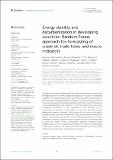| dc.contributor.author | Nyangarika, Anthony | |
| dc.contributor.author | Alexey, Mikhaylov | |
| dc.contributor.author | Muyeen, S. M. | |
| dc.contributor.author | Yadykin, Vladimir | |
| dc.contributor.author | Mottaeva, Angela | |
| dc.contributor.author | Pryadko, Igor | |
| dc.date.accessioned | 2024-11-25T07:50:17Z | |
| dc.date.available | 2024-11-25T07:50:17Z | |
| dc.date.issued | 2022-11 | |
| dc.identifier.uri | https://doi.org/10.3389/fenvs.2022.1031343 | |
| dc.identifier.uri | https://dspace.nm-aist.ac.tz/handle/20.500.12479/2814 | |
| dc.description | This research was published by Frontiers in Environmental Science volume 10 2022 | en_US |
| dc.description.abstract | The paper observes the dependence of the main macroeconomic indicators in
developing countries from the change in world prices for crude oil. We analyzed
a system of simultaneous equations, which makes it possible to verify some of
these hypotheses, and developed the model to forecast the impact of oil prices
on budget revenues. The practical significance of this work lies in the structuring
of existing knowledge on the impact of oil crisis. The results of this work can be
considered confirmation of the hypothesis of the sensitivity of U.S.
macroeconomic indicators to the dynamics of oil prices. Outcomes assume
stable growth even in the period of shock prices for oil, which is confirmed by
the statistics that were used in the model. Deep decarbonization modeling is a
trend in industrial facilities that are used by developing countries. The major
challenge is the issue of availability that is applicable to the countries that want
to utilize this facility in their communities. Industrial modeling toward
decarbonization is now a developing mechanism to curb the growing issue
of atmospheric pollution. This paper proves the relevance of promoting deep
decarbonization applied by the developing countries. | en_US |
| dc.language.iso | en | en_US |
| dc.publisher | Frontiers in Environmental Science | en_US |
| dc.subject | investment export | en_US |
| dc.subject | gross national product | en_US |
| dc.subject | normality of distribution | en_US |
| dc.subject | oil price forecasting | en_US |
| dc.subject | budget revenues | en_US |
| dc.subject | oil and gas impact | en_US |
| dc.title | Energy stability and decarbonization in developing countries: Random Forest approach for forecasting of crude oil trade flows and macro indicators | en_US |
| dc.type | Article | en_US |

